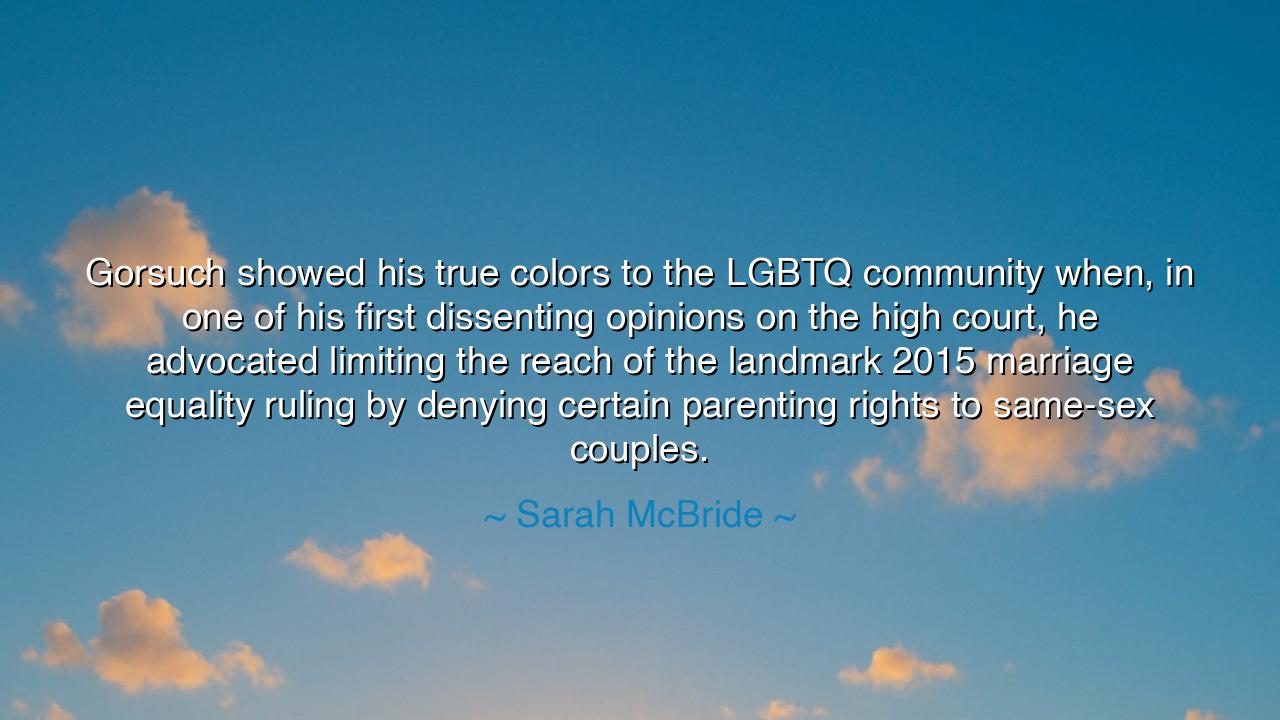
Gorsuch showed his true colors to the LGBTQ community when, in
Gorsuch showed his true colors to the LGBTQ community when, in one of his first dissenting opinions on the high court, he advocated limiting the reach of the landmark 2015 marriage equality ruling by denying certain parenting rights to same-sex couples.






In the great march of human history, where the forces of justice and equality battle against the weight of prejudice and discrimination, the words of Sarah McBride echo with a call to vigilance and truth. "Gorsuch showed his true colors to the LGBTQ community when, in one of his first dissenting opinions on the high court, he advocated limiting the reach of the landmark 2015 marriage equality ruling by denying certain parenting rights to same-sex couples." These words are not just a criticism of an individual or a legal decision; they are a warning about the ongoing struggle for equality, one that must be faced head-on with courage and clarity. For in this dissent, we see a stark reminder that while progress may be achieved, it is never assured, and the fight for justice must be constant.
The origin of this quote lies in a pivotal moment in the United States’ ongoing battle for LGBTQ rights, a battle that reached a watershed in 2015 with the Supreme Court ruling in Obergefell v. Hodges, which legalized same-sex marriage across the nation. This decision was seen by many as the culmination of years of struggle and the recognition of marriage equality as a fundamental right for all Americans, regardless of sexual orientation. Yet, as McBride points out, in one of his first dissenting opinions on the Supreme Court, Justice Neil Gorsuch showed his true colors by attempting to limit the reach of that landmark ruling. He advocated for restricting the rights of same-sex couples, particularly when it came to the recognition of their parenting rights. In this moment, Gorsuch revealed a reluctance to fully embrace the principles of equality and justice that the ruling embodied.
In ancient societies, the concept of justice was often tied to the privileges of the few, rather than the rights of the many. For instance, in Athens, the birthplace of democracy, the rights of citizens were strictly limited to free men, excluding women, slaves, and foreigners. This exclusion was justified by the belief that only certain people were deserving of equality. The idea that justice could extend to all members of society—regardless of their background, gender, or identity—was a radical one that took centuries to unfold. And yet, even in Athens, the idea of universal equality began to take root through the philosophies of thinkers like Socrates, who challenged the conventional structures of power and privilege.
The struggle for equality, however, is never linear. Just as ancient philosophers had to challenge entrenched power structures to advocate for universal rights, so too do the modern advocates for LGBTQ rights face challenges from forces that seek to limit progress. Sarah McBride’s words call attention to how, even after a monumental victory like marriage equality, there remain forces within the government—represented by figures like Justice Gorsuch—who seek to roll back these gains. It is a reminder that justice is a fragile thing, never guaranteed, and must be defended and expanded with constant vigilance. Gorsuch’s dissent, in McBride’s view, symbolizes the resistance that continues to stand in the way of full recognition and acceptance for LGBTQ individuals.
We can look back to other historical moments when the fight for equality faced setbacks in the face of powerful opposition. Consider the Civil Rights Movement in the United States, where after significant legal victories, such as the Civil Rights Act of 1964 and the Voting Rights Act of 1965, there were still forces—politicians, institutions, and societal norms—that resisted racial equality. Dr. Martin Luther King Jr. and others knew that the battle for equality was far from over. Even after monumental victories, the struggle was ongoing, and there were always voices who would seek to undermine the progress made.
Thus, the lesson we must take from McBride’s words is clear: the fight for justice and equality is never finished. Every victory—no matter how significant—must be followed by the tireless effort to defend it. Marriage equality was a monumental step forward, but as Gorsuch’s dissent shows, there are still those who seek to undermine that progress, even in small, seemingly overlooked areas like parenting rights for same-sex couples. McBride calls on all of us to be vigilant, to ensure that equality is not just a principle written in laws but a living, breathing reality for all people, regardless of their sexual orientation or gender identity.
In our own lives, we must continue to champion justice, not only through legal victories but in the everyday actions we take to support those who are marginalized. Whether it is through political activism, community support, or simply standing by those whose rights are threatened, we must be the ones to speak out and defend the rights of LGBTQ individuals. Just as the ancient philosophers challenged the norms of their time, so too must we continue to question and confront those who seek to perpetuate inequality. The struggle for justice and equality is one that requires constant action—until the day when love, in all its forms, is universally embraced, and justice truly belongs to everyone.






AAdministratorAdministrator
Welcome, honored guests. Please leave a comment, we will respond soon